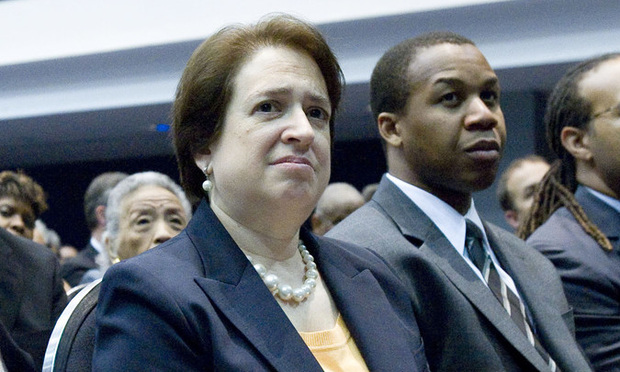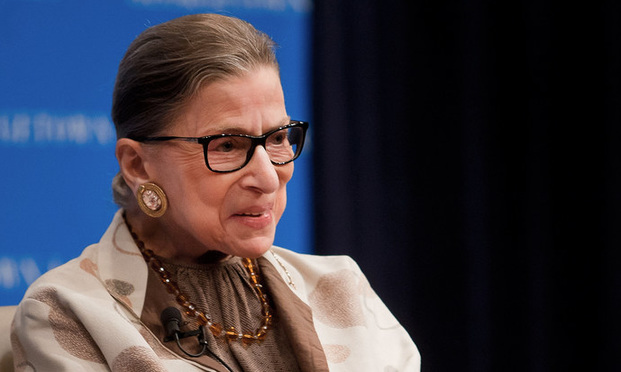Kagan's Scathing Death Row Dissent Highlights Central Voice on Religion
Conservative and liberal critics, forming an unusual alliance, have widely assailed the Supreme Court's order allowing an Alabama inmate's execution to go forward.
February 12, 2019 at 10:56 AM
5 minute read
 Justice Elena Kagan. Credit: Diego M. Radzinschi / NLJ
Justice Elena Kagan. Credit: Diego M. Radzinschi / NLJ
Justice Elena Kagan's stinging dissent last week backing an Alabama death row inmate who was executed despite an unresolved religious discrimination claim highlighted her evolving role as a key voice in religion-related cases at the U.S. Supreme Court.
The high court's conservative majority permitted the execution of a Muslim inmate named Domineque Ray, who had argued his imam should be permitted to be with him in the death chamber at the end of his life. The justices, ruling 5-4, overturned a stay of execution entered by the U.S. Court of Appeals for the Eleventh Circuit.
The appellate court had concluded there was a “substantial likelihood” that the Alabama prison's policy allowing only Christian clergy to accompany inmates violated the establishment clause. The Supreme Court, denying the stay, gave no reason but its order did suggest the inmate's claim was a last-minute attempt to delay execution. Kagan called the decision “profoundly wrong” in a dissent that was joined by justices Ruth Bader Ginsburg, Stephen Breyer and Sonia Sotomayor.
Under Alabama policy “a Christian prisoner may have a minister of his own faith accompany him into the execution chamber to say his last rites,” Kagan wrote. “But if an inmate practices a different religion—whether Islam, Judaism, or any other—he may not die with a minister of his own faith by his side. That treatment goes against the establishment clause's core principle of denominational neutrality.”
Conservative and liberal critics, forming an unusual alliance, have widely assailed the Supreme Court's order allowing the inmate's execution to go forward despite his pending claim of religious discrimination.
Ginsburg, as the senior justice in dissent, assigned the opinion to Kagan. The move marked the latest instance of Ginsburg picking Kagan to write on sensitive issues involving religion.
Kagan's first dissent as a new justice was assigned in 2011 by Ginsburg in the case Arizona Christian School Tuition Organization v. Winn. A group of taxpayers challenged an Arizona tax credit for contributions to tuition organizations. Those groups used the money for scholarships for, among others, religious schools. The majority, led by Justice Anthony Kennedy, said the challengers lacked standing because they were fighting a tax credit, not government spending.
“Taxpayers who oppose state aid of religion have equal reason to protest whether that aid flows from the one form of subsidy or the other. Either way, the government has financed the religious activity,” Kagan said in her dissent.
A more direct religion challenge came three years later in Town of Greece v. Galloway. A 5-4 majority ruled that the town's practice of opening its board meetings with prayers by clergy members did not violate the establishment clause. Ginsburg turned again to Kagan to represent the views of the dissenters.
The town board, Kagan said, “did nothing to recognize religious diversity: In arranging for clergy members to open each meeting, the Town never sought (except briefly when this suit was filed) to involve, accommodate, or in any way reach out to adherents of non-Christian religions.”
At the end of that term, Ginsburg, in an interview with The National Law Journal, explained why Kagan was her choice.
 Justice Ruth Bader Ginsburg. Credit: Diego M. Radzinschi / NLJ
Justice Ruth Bader Ginsburg. Credit: Diego M. Radzinschi / NLJ“She was an outsider even in her own religion in that she had to fight to be an insider. She had to fight to be the first girl bat mitzvahed in her Orthodox synagogue. She was insistent. She was not bat mitzvahed on a Saturday morning as the boys did; they made it a Friday night service. I think she has that sensitivity. It's something that my colleagues don't really get because they haven't been in that situation.”
Kagan once called her bat mitzvah in 1973 “the great Jewish experience of my youth.” Kagan last year recalled her youth in Manhattan as her mother “would go from synagogue to synagogue to synagogue to find a rabbi she liked.”
Last term, Kagan took a nuanced view of the role of religion in the case Masterpiece Cakeshop v. Colorado Civil Rights Commission.
The court faced a Colorado baker who had refused, based on religious beliefs, to make a wedding cake for a same-sex couple. In a concurring opinion, Kagan, joined by Breyer, said she agreed with the majority that a Colorado civil rights commission had failed to give “neutral and respectful” consideration to the baker's religious beliefs.
But if the state's anti-discrimination provisions had been applied neutrally, the baker ran afoul of the law's “demand that customers receive 'the full and equal enjoyment' of public accommodations irrespective of their sexual orientation,” Kagan said. Ginsburg wrote the dissent, joined by Sotomayor.
The justices this month will face another major religion case when they hear arguments Feb. 27 in a challenge to a 93-year-old war memorial cross on public land.
Read more:
Justice Kagan Throws Shade on Her Originalist Colleagues
Why Roberts Sided With Liberals Blocking Restrictive Louisiana Abortion Law
How to Tell a Justice They're Wrong
Justice Breyer Joins Conservative Wing to Uphold Tougher Prison Sentence
This content has been archived. It is available through our partners, LexisNexis® and Bloomberg Law.
To view this content, please continue to their sites.
Not a Lexis Subscriber?
Subscribe Now
Not a Bloomberg Law Subscriber?
Subscribe Now
NOT FOR REPRINT
© 2025 ALM Global, LLC, All Rights Reserved. Request academic re-use from www.copyright.com. All other uses, submit a request to [email protected]. For more information visit Asset & Logo Licensing.
You Might Like
View All

DC Circuit Revives Firefighters' Religious Freedom Litigation in Facial Hair Policy Row
3 minute read
Federal Judge Pauses Trump Funding Freeze as Democratic AGs Plan Suit
4 minute read
4th Circuit Upholds Virginia Law Restricting Online Court Records Access
3 minute readTrending Stories
- 1Uber Files RICO Suit Against Plaintiff-Side Firms Alleging Fraudulent Injury Claims
- 2The Law Firm Disrupted: Scrutinizing the Elephant More Than the Mouse
- 3Inherent Diminished Value Damages Unavailable to 3rd-Party Claimants, Court Says
- 4Pa. Defense Firm Sued by Client Over Ex-Eagles Player's $43.5M Med Mal Win
- 5Losses Mount at Morris Manning, but Departing Ex-Chair Stays Bullish About His Old Firm's Future
Who Got The Work
J. Brugh Lower of Gibbons has entered an appearance for industrial equipment supplier Devco Corporation in a pending trademark infringement lawsuit. The suit, accusing the defendant of selling knock-off Graco products, was filed Dec. 18 in New Jersey District Court by Rivkin Radler on behalf of Graco Inc. and Graco Minnesota. The case, assigned to U.S. District Judge Zahid N. Quraishi, is 3:24-cv-11294, Graco Inc. et al v. Devco Corporation.
Who Got The Work
Rebecca Maller-Stein and Kent A. Yalowitz of Arnold & Porter Kaye Scholer have entered their appearances for Hanaco Venture Capital and its executives, Lior Prosor and David Frankel, in a pending securities lawsuit. The action, filed on Dec. 24 in New York Southern District Court by Zell, Aron & Co. on behalf of Goldeneye Advisors, accuses the defendants of negligently and fraudulently managing the plaintiff's $1 million investment. The case, assigned to U.S. District Judge Vernon S. Broderick, is 1:24-cv-09918, Goldeneye Advisors, LLC v. Hanaco Venture Capital, Ltd. et al.
Who Got The Work
Attorneys from A&O Shearman has stepped in as defense counsel for Toronto-Dominion Bank and other defendants in a pending securities class action. The suit, filed Dec. 11 in New York Southern District Court by Bleichmar Fonti & Auld, accuses the defendants of concealing the bank's 'pervasive' deficiencies in regards to its compliance with the Bank Secrecy Act and the quality of its anti-money laundering controls. The case, assigned to U.S. District Judge Arun Subramanian, is 1:24-cv-09445, Gonzalez v. The Toronto-Dominion Bank et al.
Who Got The Work
Crown Castle International, a Pennsylvania company providing shared communications infrastructure, has turned to Luke D. Wolf of Gordon Rees Scully Mansukhani to fend off a pending breach-of-contract lawsuit. The court action, filed Nov. 25 in Michigan Eastern District Court by Hooper Hathaway PC on behalf of The Town Residences LLC, accuses Crown Castle of failing to transfer approximately $30,000 in utility payments from T-Mobile in breach of a roof-top lease and assignment agreement. The case, assigned to U.S. District Judge Susan K. Declercq, is 2:24-cv-13131, The Town Residences LLC v. T-Mobile US, Inc. et al.
Who Got The Work
Wilfred P. Coronato and Daniel M. Schwartz of McCarter & English have stepped in as defense counsel to Electrolux Home Products Inc. in a pending product liability lawsuit. The court action, filed Nov. 26 in New York Eastern District Court by Poulos Lopiccolo PC and Nagel Rice LLP on behalf of David Stern, alleges that the defendant's refrigerators’ drawers and shelving repeatedly break and fall apart within months after purchase. The case, assigned to U.S. District Judge Joan M. Azrack, is 2:24-cv-08204, Stern v. Electrolux Home Products, Inc.
Featured Firms
Law Offices of Gary Martin Hays & Associates, P.C.
(470) 294-1674
Law Offices of Mark E. Salomone
(857) 444-6468
Smith & Hassler
(713) 739-1250








